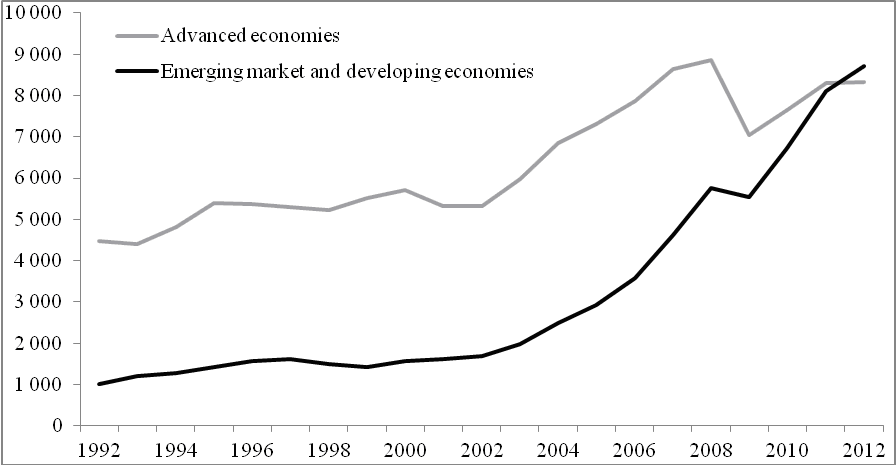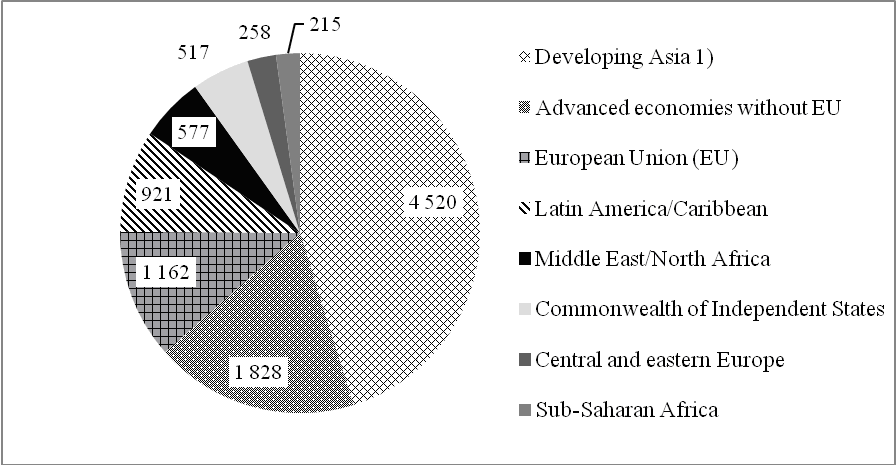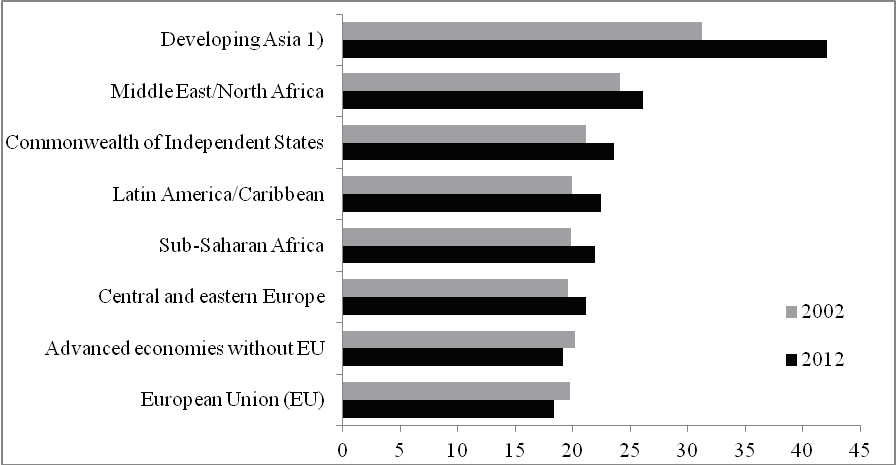Is Abenomics a Success?
February 6, 2014
Japan, the third largest economy in the world, has set up strategies for economic growth plans, namely Abenomics in an attempt to resolve its specific economic problems. Ongoing discussions on desirability of their strategic economic growth plans and concerns on their influence on the neighboring economies in the Asian region and on the globe are hanging albeit some of their macroeconomic indicators show arguable signs of heading to the right direction. This article takes a brief look at the cores of the strategic growth plans of the giant economy and evaluates Abe’s economic growth plans in 2013, addressing challenges of Abenomics that are lying ahead.
Abenomics to bounce back
Abenomics which is named after the Japanese prime minister Shinzo Abe got off to a start after the won the re-election in December 2012 with proposing economic growth plans including 1) carrying out aggressive expansion of the governmental expenditure; 2) supporting continual monetary easing via QE (quantitative easing); and 3) running structural reforms to enhance competitiveness of the whole country. The Keynesian-inspired economic growth plan of Abe is aimed at sparkling life into the economy from the 15-year-long deflation through monetary, fiscal and structural policies. This stimulus package along with structural reform worth above $200 billion is focused on government spending with infrastructure projects for building bridges, tunnels, and earthquake-resistant roads, which was already approved by the cabinet in January 2013. The Bank of Japan (BoJ) is embracing the stimulus plan and has set an inflation target of 2 percent (from an earlier target of 1 percent) in January 2013, which it commits to achieve via quantitative easing of buying up mostly short-term government debt that is due to start in 2014.
How will the plan reflate Japan’s economy – and what has been done?
It was hoped that the aggressive monetary expansion will weaken the Japanese Yen, which would give exports a major boost, leading to a rise in corporate earnings, boosting the stock market, resulting in higher wages, thus increasing private consumption and finally escaping from the trap of deflation. As was hoped, the weakening yen against the dollar has taken it to reach to the five-year-low of 105 against the dollar, making yen depreciation against the dollar by 19,9 percent in 2013. [1] As the benefits of a weak yen started to take effect, Japanese exports rose in 2013 along with an increase in sales of cars and electronics to the United States, Europe and Asia, where some signs of recovery in overseas demand are being shown. The stock market rally also followed. Nikkei 225 reached a six-year high and took around 50 percent gain in 2013. News on ‘end of deflation’ followed.
According to the statistics announced by the government in October 2013, Japan’s core consumer price index (excluding food), rose by 0.7 percent in September compared with the same month a year ago, making the fourth monthly gain in a row. Including food prices, the index increased by 1.1 percent. Furthermore, in an survey of 1,000 Japanese retail investors done by Goldman Sachs Asser Management in 2013, 56% percent of respondents replied that they expected deflation to end soon. Based on these indicators as above, Shinzo Abe’s economic policies have achieved success so far. However, there are challenges lying ahead.
Challenges lying ahead
The success of Abenomics so far in large part is indebted to the weakening of yen, which involves two risks. First, weakening yen itself has a downside for the Japanese economy. According to the data of Ministry of Finance released in July 2013, for example, imports to Japan rose 19.6 percent in July 2013, a three-year high, due to a jump in the cost of imports for crude oil and liquefied natural gas. As a result, Japan has an increasing trade deficit, exceeding 1 trillion yen. These rising costs of imports for energy and raw material may press down Japanese corporate profits, which would be negative for Japanese economy.
Second, there is a growing concern over the ripple effect of decline in yen over the globe. In the Asian region including South Korea and Europe are wary of competitive devaluation of countries to boost demand for domestic industry by maintaining domestic currencies weak. In other words, the success of Abenomics depends on other countries not jumping on the wagon of depreciating their currencies, thereby maintaining competitiveness in the international arena.
However, there are economies that start to react to the yen decline. The central bank of Korea already cut its benchmark interest rate by surprise in May 2013, Australia cut its key interest rate to a record low in August 2013, and the same trend in interest rate cut was also followed in Thailand. The world export-led economies in the world like Germany and China are clearly worried. Especially regarding China, the yen decline gets intertwined with even more convoluted China-Japan conflicts.
As was mentioned above, the third core of Abenomics include structural reforms and joining the Trans-Pacific Partnership (TPP) [2] for liberalization measures with its major trading partners. The sovereign disputes over the Diaoyu/Senkaku between Beijing and Japan in the East China Sea have spilled over into Sino-Japan relationships including the economic relationship, which got even exacerbate worse due to Abe’s visit to a shrine that honours Japan’s war crimes including some convicted war criminals. China takes 20 percent of Japan’s trade and thus how successful Abenomics will be in the coming years cannot be free from its economic relationship with China. Abe’s hawkish and nationalistic approach not only distracts the agenda for economic reforms but jeopardizes also economic and political relationships with neighboring countries.
Critics on Abenomics also put Japan’s enormous public debt at the forefront of many criticisms. Japan’s national debt, which exceeds 10 trillion US dollar is more than twice its GDP, is even too large to afford a moderate rise in interest rates. Concerns of some investors who are anticipating inflation is that rising interest rates would have a negative impact on the trade deficit and fiscal position of the government. Such a concern was expressed by Martin Feldstein who wrote in project syndicate that “…the combination of exploding debt and rising interest rates is a recipe for economic disaster.”
Summing up, Abe’s economic plans have shown signs of success in 2013. However, there are growing concerns as to feasibility of its continuing success in the coming years due to the risks that Abe’s policy takes including what is-so-called ‘currency war’, tremendous public debt and disputes with influential economic partners in the region. Whether Abenomics is a success and whether Japan really has bounced back will be tested again with challenges lying ahead in 2014.
[1] Average of weekly MIDPOINT rates. Source: Oanda.com
[2] A proposed regional free trade agreement being negotiated between the United States and eleven other countries in Asia and the Americas.
Hyunjoo Kim Karlsson
Senior Lecturer, Linnaeus University






